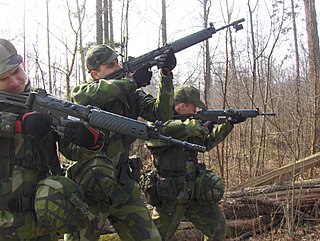
Conscription is the state-mandated enlistment of people in a national service, mainly a military service. Conscription dates back to antiquity and it continues in some countries to the present day under various names. The modern system of near-universal national conscription for young men dates to the French Revolution in the 1790s, where it became the basis of a very large and powerful military. Most European nations later copied the system in peacetime, so that men at a certain age would serve 1–8 years on active duty and then transfer to the reserve force.

A conscientious objector is an "individual who has claimed the right to refuse to perform military service" on the grounds of freedom of thought, conscience, or religion. The term has also been extended to objecting to working for the military–industrial complex due to a crisis of conscience. In some countries, conscientious objectors are assigned to an alternative civilian service as a substitute for conscription or military service.

Conscription in Australia, also known as National Service following the Second World War, has a controversial history which dates back to the implementation of compulsory military training and service in the first years of Australia's nationhood. Military conscription for peacetime service was abolished in 1972.

Military service is service by an individual or group in an army or other militia, air forces, and naval forces, whether as a chosen job (volunteer) or as a result of an involuntary draft (conscription).

The Federal Republic of Germany had conscription (Wehrpflicht) for male citizens between 1956 and 2011. On 22 November 2010, the German Minister of Defence proposed to the government to put conscription into abeyance on 1 July 2011. The constitution, however, retains provisions that would legalize the potential reintroduction of conscription.
The Voluntary Social Year in Germany and, in a much lesser dimension, in Austria, is a government-funded voluntary work program particularly for young adults. It can last between six and eighteen months. It can also be spent abroad.

Military service in the Cypriot National Guard is mandatory for all male citizens of the Republic of Cyprus, as well as any male non-citizens born of a parent of Greek Cypriot descent, lasting from the January 1 of the year in which they turn 18 years of age to December 31, of the year in which they turn 50. All male residents of Cyprus who are of military age are required to obtain an exit visa from the Ministry of Defence.

The Center on Conscience & War (CCW) is a United States non-profit anti-war organization located in Washington, D.C., dedicated to defending and extending the rights of conscientious objectors. The group participates in the G.I. Rights Hotline, and works against all forms of conscription. There are no charges for any of CCW's services.

The Civilian Public Service (CPS) was a program of the United States government that provided conscientious objectors with an alternative to military service during World War II. From 1941 to 1947, nearly 12,000 draftees, willing to serve their country in some capacity but unwilling to perform any type of military service, accepted assignments in "work of national importance" in 152 CPS camps throughout the United States and Puerto Rico. Draftees from the historic peace churches and other faiths worked in areas such as soil conservation, forestry, fire fighting, agriculture, under the supervision of such agencies as the U.S. Forest Service, the Soil Conservation Service, and the National Park Service. Others helped provide social services and mental health services.

In Turkey, compulsory military service applies to all male citizens from 21 to 41 years of age. It is 6 months for all males regardless of education degree. Different rules apply to Turks abroad. For Turks with multiple citizenship, the conscription lapses if they have already served in the army of another country.
Conscientious objection to military taxation (COMT) is a legal theory that attempts to extend into the realm of taxation the concessions to conscientious objectors that many governments allow in the case of conscription, thereby allowing conscientious objectors to insist that their tax payments not be spent for military purposes.

The End Conscription Campaign was an anti-apartheid organisation allied to the United Democratic Front and composed of conscientious objectors and their supporters in South Africa. It was formed in 1983 to oppose the conscription of all white South African men into military service in the South African Defence Force.

Zivildienst is the German denomination for the alternative civilian service for conscripted persons who are conscientious objectors to fulfill their national service, typically in the fields of social work and, although rarely, environmental protection, agriculture, and public administration. As such, it is exempt from the general ban of forced labor by the European Convention on Human Rights.

Conscription in the Netherlands was first employed in 1810 by French occupying forces. Napoleon's brother Louis Bonaparte, who was King of Holland from 1806 to 1810, had tried to introduce conscription a few years earlier, unsuccessfully. Every man aged 20 years or older had to enlist. By means of drawing lots it was decided who had to undertake service in the French army. It was possible to arrange a substitute against payment.
The Constitution of Armenia as amended in December 2005 provides for freedom of religion; however, the law places some restrictions on the religious freedom of adherents of minority religious groups, and there were some restrictions in practice. The Armenian Apostolic Church, which has formal legal status as the national church, enjoys some privileges not available to other religious groups. Some denominations reported occasional discrimination by mid- or low-level government officials but found high-level officials to be tolerant. Jehovah's Witnesses reported that judges sentenced them to longer prison terms for evasion of alternative military service than in the past, although the sentences were still within the range allowed by law. Societal attitudes toward some minority religious groups were ambivalent, and there were reports of societal discrimination directed against members of these groups.

Civil conscription is the obligation of civilians to perform mandatory labour for the government. This kind of work has to correspond with the exceptions in international agreements, otherwise it could fall under the category of unfree labour. There are two basic kinds of civil conscriptions. On the one hand, a compulsory service can be ordered on a temporary basis during wartimes and other times of emergency, like severe economic crisis or extraordinary natural events to provide basic services to the population. These include, but are not limited to, medical care, food supplies, defense industry supplies or cleanup efforts, following a severe weather or environmental disaster for the duration of the emergency. Therefore, it generally makes striking illegal for the duration of the civil mobilization. On the other hand, a revolving mandatory service may be required for a longer period of time, for example, to ensure community fire protection or to carry out infrastructure work at a local or community level.
The Zivildienst is the most common mandatory alternative service for conscientious objectors of the national military service in the Austrian Armed Forces. Officially called Zivildienstleistender (ZDL) or Zivildiener it is common to call them Zivi. Since 1975, drafted men may refuse the military service on conscientious reasons and serve in the compulsory alternative community service instead. This generally involves work in social services like hospitals, youth organisations, nursing homes, rescue services, emergency medical services, and care of the disabled. The service usually lasts nine months. About more than 40% of the drafted male citizens in Austria choose this option by declaring a conflict of conscience. There is no conscription for women, therefore women are not obliged to serve as a Zivi, which is just a substitute for the still existing mandatory military service.
A construction soldier was a non-combat role of the National People's Army, the armed forces of the German Democratic Republic, from 1964 to 1990. Bausoldaten were conscientious objectors who accepted conscription but refused armed service and instead served in unarmed construction units. Bausoldaten were the only legal form of conscientious objection in the Warsaw Pact.

Sweden has partial conscription for both men and women since 2017.
Conscientious objection in the United States is based on the Military Selective Service Act, which delegates its implementation to the Selective Service System. Conscientious objection is also recognized by the Department of Defense.





